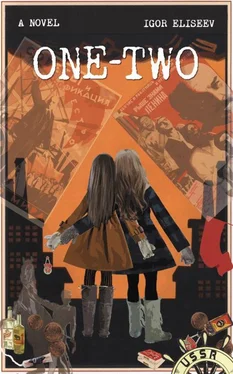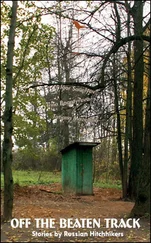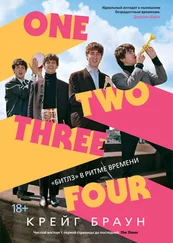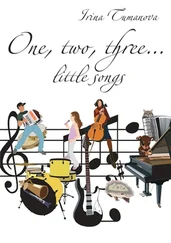* * *
Our working schedule was similar to that of the rest of the country, five days a week; from early morning we stood in the tunnel, incessantly making ourselves and any impressionable passersby uncomfortable. On our days off, looking for something to occupy myself with, I started reading the books we had found in the old chest. The process turned out to be so exciting that soon I couldn’t stop. I was reading constantly – while you were sleeping, in the subway or in a store, at home in the light of a street lamp – anywhere I could seize a spare moment and a clear space. I had the unshakeable feeling that these books had been specially written for me and put into the chest so that I could find and read them.
Little by little, out of my own “pocket library”, I learned that our world is full of stories about love and hatred, about beautiful things and ugly things, about good and evil. Each has his predetermined fate allotted him. Those few who get lucky and are born good-looking are conferred the part of hero, and those who are less lucky or completely unlucky are given very unattractive parts: despicable villains, outcasts, or worse. And it doesn’t matter what I am inside my soul; what leads me to preserving the human essence is not in my head, not even in my heart – but it doesn’t matter! Doesn’t matter at all…
And while I devoured books, you looked around suspiciously, obviously bored. I tried in every possible way to involve you in the reading process, but nothing worked. Despite the fact that we are twins, moreover conjoined twins, and must have a lot in common, we often didn’t talk for long hours. Being not alone physically, none the less, I felt lonely from time to time. And that was how a whole year passed; it seemed as though time had frozen up. However, there wasn’t even the slightest sign of integration. I was changing, you were changing, and everything around us was changing.
The supervisor who took us out of prison turned out to be a disgusting type, but due to necessity rather than pleasure. The pug where his head should have been looked at everybody with glistening and, at times, tear-stained eyes, always clouded with indifference and boredom. With gloomy constancy he tried to inspire us with respect and fear, but instead he evoked only hatred and open hostility. Actually, there was nothing mindless or cowardly about him, neither great nor terrible, but the total absence of everything. Twice a day he collected a tribute from all the beggars who, uncomplaining and unanimous, emptied pockets before him. However, we kept a part of our earnings – our “due” wages.
Very soon we started making a substantial income for the pug. Because of that, our “colleagues” (other cripples in the tunnel) were continuously furious and jealous, for now people were throwing us their money – the money they could have made and must have wanted. Possibly, in revenge for success or probably just “pro forma”, we were nicknamed Hydra. Naive blunderers. Didn’t they understand that we had got used to such treatment from childhood? The only person who really liked us was the hero of the Patriotic War, a disabled old man from the house across the way. He came into the tunnel three times a week, on odd days, never even. On the other days, he could be seen at a cemetery where he brought flowers to the graves of his family. In the tunnel he was begging like everybody else.
However, he was an independent person, not subject to supervision. People still kept up the appearance of conscience, so no one dared to call him a bad name. Having paid his military due to the homeland, he proved to his full extent that he was worth any place, even the money-making tunnel. However, passersby seldom gave him alms, for he had an inappropriate, proud look. He’d lost his legs in the war, one of them completely, and the stump of the other ended somewhere at knee-height. While other legless beggars sat on low, wooden platforms with four wheels at their corners, he moved around in an old wheelchair, dexterously manipulating it with his strong hands. Everybody called him Ivan. Just Ivan. He didn’t wish to hear either his patronymic, or his last name. He looked about seventy years old, always clean-shaved, neat and tidy. Cleanliness was essential to him, and we got along with him well.
“If you want to survive, you should not get sick; and in order not to get sick, you have to keep your body clean,” he used to say.
He lost all his family long ago: his brother and his father were shot by the chief authorities, his mother died of typhus. His reason for living existed far back in the past, and a lonely death awaited him in the present. However, he actually wanted to die and lived in anticipation of death, not distracted by life’s hardships and not frittering away his strength with futile feelings.
Having noticed that we were constantly scratching ourselves, he immediately suggested we take a shower at his house. Tormented by remorse, we nevertheless agreed very quickly because this trivial option to be clean, readily available to almost everyone, was a great blessing to us. Surprisingly little is known about how often happiness can depend on such absolute trifles.
Ivan lived in a communal apartment (Communal apartment – an apartment where several families dwell in isolated premises. Each family or individual person occupies one or several rooms, sharing “common areas” which generally are a bathroom, toilet and kitchen as well as a corridor and a hall). Not wishing to disturb his neighbors, he used to bring us to his place only at night. Every time he gave us two towels. Honestly, I’d got out of the habit of being treated like that and instinctively waited for some kind of wild game trap, but he turned on the tap and waited next to the shower-room door, watchfully guarding the entrance.
“At least I have a place to live, thanks to the government,” he comforted himself thinking out loud. “They promised to grant us separate apartments, but I’ve been waiting for that for about twenty years. It’s all right; I don’t want to complain… it is what makes us human.”
Strong affection often grows from dependence, and after all, you and I really depended on him; there’s no reason to deny it. Nevertheless, there was something bigger between us than the usual attachment and gratitude; it was true friendship, though unfortunately very short. I remembered him as an incredibly responsible person, living in strict accordance with his schedule; therefore, when he didn’t appear in the tunnel, we knew the reason right away: the old man’s wait was over. He lived like few people do but died like everybody else.
Meanwhile, the country sank deeper and deeper into an atmosphere painfully reminiscent of our tunnel, where nobody believed in anything and nobody trusted anyone. People traded all they could: veterans sold their awards, actresses adored by millions of fans across the country offered their hungry bodies and even those who did not have anything bartered what remained of their conscience for money.
In our crippled country, we ceased to be cripples.
That year’s “abundant” events agitated the whole country. But also something minor, personal and very amusing happened at an odd moment. We still had to sleep in the abandoned house, which we diligently returned to every evening. One fine evening, tired and exhausted after standing on our feet all day, drenched to the skin and dreaming only of lying down as soon as possible, we got home… and suddenly our routine was interrupted, crushed. As we entered the house, we found uninvited guests sitting near a fire that they had kindled. They were arguing about something, trying to outshout the thunder peals; it was lashing down outside, lightning lit the sky. Nature stormed in its heart. Despite fatigue, we were in an excellent mood; I always loved a thunderstorm, for it washed all my troubles away.
Читать дальше












